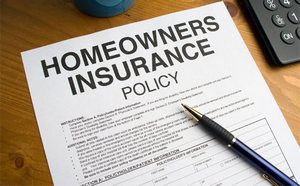Hazard insurance when buying a house
 Most home buyers wait until mortgage approval before obtaining an insurance policy for their new home. But this can be a mistake because the cost of homeowner’s insurance is based on the replacement cost of the home, not the purchase price. Newer homes cost less than older homes with historic or architectural distinction because the replacement cost of the newer home is easily determined. Old unique homes require more specialized reconstruction. Location is another consideration in the cost of the home. Areas that are serviced by a full time fire department will reduce the insurance cost. Areas that are serviced by a part time, volunteer fire department poses more risk to the insurance company. Fire hydrants can drastically reduce the homeowner’s premium. Recently, insurance companies are penalizing homebuyers for claims by the previous owner. That doesn’t seem fair, but it’s occurring. Few home buyers ask the seller what their homeowner’s insurance cost them.
Most home buyers wait until mortgage approval before obtaining an insurance policy for their new home. But this can be a mistake because the cost of homeowner’s insurance is based on the replacement cost of the home, not the purchase price. Newer homes cost less than older homes with historic or architectural distinction because the replacement cost of the newer home is easily determined. Old unique homes require more specialized reconstruction. Location is another consideration in the cost of the home. Areas that are serviced by a full time fire department will reduce the insurance cost. Areas that are serviced by a part time, volunteer fire department poses more risk to the insurance company. Fire hydrants can drastically reduce the homeowner’s premium. Recently, insurance companies are penalizing homebuyers for claims by the previous owner. That doesn’t seem fair, but it’s occurring. Few home buyers ask the seller what their homeowner’s insurance cost them.
TIP
If you are in the early stages of buying a home, always ask the seller the cost of their homeowner’s insurance premium before making an offer to purchase.
Lenders guess at the likely homeowner’s insurance premium atpre-approval and at application. Lenders cannot accurately predict the cost of the homeowner’s insurance for a home. Consequently, many homebuyers have sticker shock when they price out an insurance policy after approval. The cost of the homeowner’s insurance is paid for out of the mortgage payment. For example, if the annual policy costs $360. The monthly cost is $30. But what if the lender estimated $360 per year and most insurance companies quoted $720? The monthly payment will increase by $30. Another consideration is thedebt to income ratio. If the actual cost of the insurance is higher than the original estimate by the loan officer, the loan can be denied at the last minute due to the increased homeowner's insurance cost.
Typical policy coverage
The most basic homeowner's policy protects your home from fire, vandalism, theft, lightning, and windstorms. Shrubbery, trees, and outside structures are also included in most policies. The typical policy usually pays for living expenses if the home is not habitable or is necessary due to the repair of the dwelling. Additional coverage can be purchased to protect the home against damage from frozen pipes, falling objects, and sprinkler systems. The policy includes protection from virtually everything except war, nuclear accident, earthquakes,floods, usual wear, and tear, intentional loss, etc. Personal belongings are usually covered at 50% of the replacement cost of the home. For example, if the home is insured at $100,000, the contents of the home would be covered up to $50,000.
Most insurance policies will provide liability coverage to protect you against a lawsuit in case someone is hurt on your property and sues you over it. Guests tripping on stairs, walkways, slipping on un-shoveled snow that has turned to ice or the postal carrier getting bitten by your dog can all result in lawsuits.
Shopping for homeowner’s insurance
 The standard homeowner’s policy is known as HO-3. This policy can provide coverage for 100 percent of the replacement value of your home. It is important that you secure replacement coverage, which is what it would cost to rebuild the home at today's prices. If you do not know what that cost would be, ask your insurance agent or call in an appraiser. Condominiums are covered by an HO-6 policy and have policy protections different than the typical protections of a single-family home.
The standard homeowner’s policy is known as HO-3. This policy can provide coverage for 100 percent of the replacement value of your home. It is important that you secure replacement coverage, which is what it would cost to rebuild the home at today's prices. If you do not know what that cost would be, ask your insurance agent or call in an appraiser. Condominiums are covered by an HO-6 policy and have policy protections different than the typical protections of a single-family home.
You may want to consider insuring your home for more than it is worth, since it would probably cost you more to rebuild it in the future. If you purchased a $200,000 home, consider insuring it for $250,000. Ask the insurance agent the premium difference, and remember, the personal property coverage increases when the coverage increases.
Do you have expensive jewelry, baseball cards, or other expensive possessions? Unique and irreplaceable possessions may not be covered by the standard policy. A policy rider may be necessary to specifically insure valuables.
Replacement cost
Ask the insurance agent, if the policy contains guaranteed replacement-cost coverage. Most homebuyers rarely think about checking the coverage of the insurance policy and tend to remain with the company that first sold them their first homeowner’s policy. After a few years, the home will increase in value along with the replacement cost. If the policy does not have a “guaranteed replacement-cost” provision, the originally policy may not cover the total restoration of the home.
 Frequently Asked Questions About homeowner's insurance
Frequently Asked Questions About homeowner's insurance
Q. What is the difference between the homeowner's insurance and mortgage insurance?
A. Mortgage insurance is an expense that insures the lender against the borrower's default on the loan. Homeowner's insurance protects the home buyer and lender against hazards like fire, theft of property, etc.
Q. Do you need home insurance when buying a house?
A. Regardless of whether you're paying cash or financing your new home, you should purchase homeowner's insurance. If you're financing the purchase, the lender will require a homeowner's policy to protect their investment in the house.
Q. When do I get home insurance when buying a house?
A. I believe you should seek one or two estimates BEFORE making an offer on a house. Why? Because the insurance premium can be unbelievable if the home has ornate woodwork, or other features that will drive up the reconstruction cost. In the past, home buyers called their insurance agent a few days before closing for a policy, but now, insurance companies want the insurance agent to inspect the house prior to committing to a home owner's policy. Ask your insurance agent about the desired lead time for purchasing a home owner's policy.
Q. How does a homeowner's insurance work when buying a house?
A. When you purchase a home, you will pay the insurance policy in full at or just before settlement. And each month, the lender will collect 1/12th of the insurance policy. The insurance cost will be added to your mortgage payment. After 12 months of payments, there will be enough money in your account to pay for the homeowner's insurance when the policy renews.